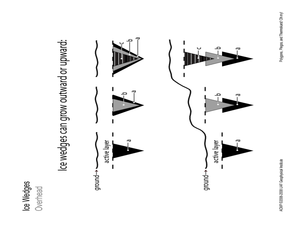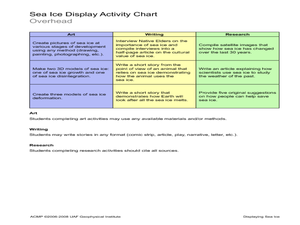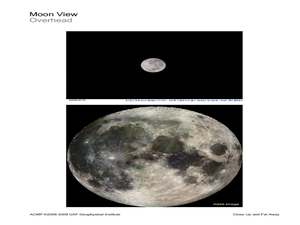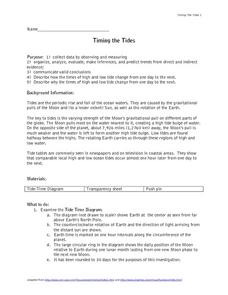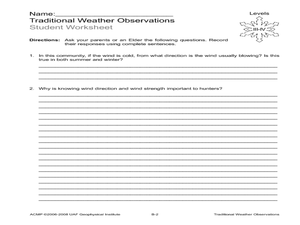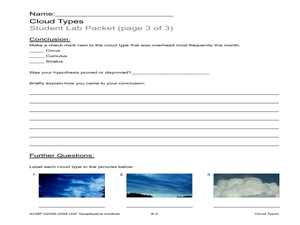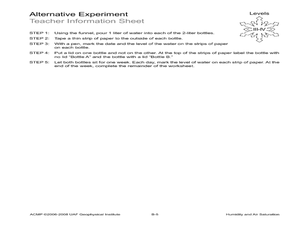Curated OER
Wind
Students build an anemometer and measure wind speed. In this wind speed lesson, students build an anemometer using the student instruction sheet. Students visit the Alaska windspeed website and look up the wind speed forecast. Students...
Curated OER
Worming Your Way Through the Soil
Students study soil, living and non-living particles in the soil, and learn about composting. In this soil study lesson, students study soil samples and discuss the living and non-living components of the soil. Students classify the...
Curated OER
Polygons, Pingos, and Themokarst! Oh MY!
Students complete activities to learn about the common land features in Alaska. In this land study lesson, students study an overhead for permafrost features. Students define ice wedge polygons, thermokarst, and pingos. Students also...
Curated OER
Layering the Soil
Students study and classify soil. In this soil science lesson, students classify soil by texture and size and study soil horizons. Students label the soil types with their specific soil horizon and learn about permafrost. Students...
Curated OER
Collecting Compost
Students observe a composting box. For this soil lesson, students create a composting bin by using a bin, newspaper, worms, and food scraps. Students create a composting food web.
Curated OER
Identifying Sea Ice
Students study different types of sea ice and interview an Yupik elder or local hunter. For this sea ice lesson, students study the native language for sea ice terms. They interview an elder from Alaska's northern coast about their...
Curated OER
Displaying Sea Ice
Students display their knowledge of sea ice. In this earth science lesson, students create displays reflecting their understanding of sea ice.Students research the development of sea ice on a variety of bodies of water, and use proper...
Curated OER
Permafrost: Permanently Frozen Ground
Students explore permafrost. In this 3 states of matter lesson, students identify characteristics of solids and liquids. Students observe water and soil melting and freezing at various temperatures. Students make predictions about a...
Curated OER
Sea Ice and Satellites
Students study satellites and satellite images using Google Earth. For this satellite lesson, students discuss satellites and how they work. Students watch a demonstration of how satellites work and learn what they are used for. Students...
Curated OER
Close Up and Far Away
Students use magnifiers and telescopes to view things close up. In this magnifiers and telescopes lesson plan, students use the tools to identify things that are close and far away. Students tell details of things they can see closer.
Curated OER
Do You Have Change?
Students analyze data and complete a worksheet about land use change in a coastal region. In this land use lesson, students discuss events that cause land use changes in coastal areas. They construct a change table to summarize data on...
Curated OER
Consistent Circles
Students create a design of a circle. In this geometry lesson, students identify the measure of the diameter and radius of a circle. They graph and analyze their collected data and write equations based on direct variation.
Curated OER
Build Your Own Car
Students design and build their own cars. In this physics lesson, students test their car's speed and make changes when necessary. They graph data and analyze results.
Curated OER
Probability: Playing With Fire
Students problem solve to find the probability of each tree in a small forest to catch fire. In this probability lesson plan, students use the computer to complete this application.
Curated OER
Are You Thirsty? The Effects of Pollution on Drinking Water
Discuss the availability of clean, plentiful water and the causes of water pollution. In groups, sixth graders discuss problem-solving methods for keeping water clean. They explore the function of water treatment plants and perform...
Curated OER
Timing the Tides
Students collect data and describe how and why the high and low tides change from day to day. In exploring tides activity students study tides by taking notes, recording data and analyzing their findings.
Curated OER
Weather Report Chart
Young scholars complete a weather report chart after studying weather patterns for a period of time. In this weather report lesson plan, students measure temperature, precipitation, cloud cover, wind speed, and wind direction for a...
Curated OER
Weather Observation Journal
Young scholars research weather patterns. In this weather lesson, students read Chester Noongwook's Rules of Weather Observation and keep a weather journal for one month. Young scholars observe the weather patterns throughout the month.
Curated OER
Traditional Weather Observations
Learners explore traditional methods of weather observation. In this weather instructional activity, students interview grown-ups regarding wind. Learners learn how winds can help forecast weather.
Curated OER
Cloud Types
Students examine cloud types. In this cloud lesson, students identify cloud types, observe clouds and collect data, and analyze data to identify the most common cloud they observe overhead during the course of a month.
Curated OER
Solid Water
Students turn solid water (ice) into liquid water. In this solid and liquid water lesson plan, students use water, ice, cups, and heat in order to change water from one state to another. They draw their findings as well.
Curated OER
Make a Snowflake
Students study the design of snowflakes. In this snow lesson, students discover the different shapes of a snowflake, and their similarities. Students study snowflakes outside, then create their own with popsicle sticks and glue.
Curated OER
Snowfall
Students examine the differences between snow and rain. In this precipitation lesson, students measure one inch of rain and snow to calculate the amount of liquid water. Students use a snowfall "conversion" chart to measure how much...
Curated OER
Humidity and Air Saturation
Young scholars experiment with air saturation. In this earth science lesson, students first complete an activity which teaches humidity. Then they use the scientific method to create their own experiments to test how long it takes a...




